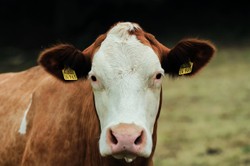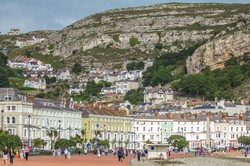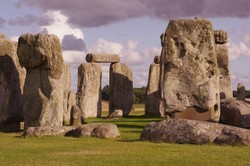One contest that I enjoy watching on television is One Man and his Dog, jointly screened by the BBC and Telefis Erin. Female readers should not think that it is an exclusively male manifestation of patriarchy, for there have been several women winners. The words are the first line of an old folk song. In this contest shepherds from each of the four nations compete to demonstrate shepherding skills. I cannot say that I am happy with the result, as England rarely win, but that's sport for you! However, since penning the previous sentence a miracle has occurred. A team headed by an English woman won the 2021 competition. In competitions like this local loyalties are eclipsed, but they soon spring back.
But within these nations strong local identities compete in sport. Roses matches pit teams from Yorkshire, England's biggest county, against neighbouring Lancashire. The contest is fiercest at cricket, but even at football, which has no inter-county competition, there is an extra frisson of excitement when a Lancashire team meets a Yorkshire side. The rivalry goes back to the Middle Ages when the Dukes of Lancaster [red rose] fought for the crown against the Dukes of York [white rose] in the bloody Wars of the Roses and warring bands fought across the Pennine hills that divide these counties. The identities formed have left their trace.
But strangely, both combine in a sense of northern Englishness when contrasting themselves with the south of England. There are six counties in Northern England, five of which were part of the ancient kingdom of Northumbria [Cumberland was independent until the early Norman period, but at times was part of Scotland.] A seventh county has in my lifetime increasingly been accounted part of the North. Cheshire, immediately south of Lancashire, receives northern television from the BBC and so, not with the universal consent of its residents, many of whom were raised to see themselves as midlanders, has fallen into the northern ambit. Modern communications are shaping identity.
Northern identity has never gelled into a cohesive political form, despite efforts to make it happen. A Northern English independence party had, last time I heard, only four members, and an attempt to institute a northern English assembly with legislative powers fell flat. We opted for a new system of powerful metropolitan mayors for the big cities.
Local identities at city level are strong at places in the North. Liverpool people, nicknamed Scousers after a popular dish called scouse, have a distinctive accent which linguists believe is strongly influenced by contact with Dublin, across the Irish Sea, a city with which Liverpool has much contact. To hear a Liverpool accent just listen to the Beatles. Liverpool has an intense soccer rivalry with Manchester, thirty miles to the east. Identities here are strong. A similar soccer rivalry occurs in the North East between Newcastle, whose people are known as Geordies, and Sunderland folk, known as Mackems.










 Darkness over the Earth the skies darkened when Jesus was crucified17 days ago
Darkness over the Earth the skies darkened when Jesus was crucified17 days ago
 TheThousand Year Gardenon 11/26/2025
TheThousand Year Gardenon 11/26/2025
 Women of the Gospelson 10/11/2025
Women of the Gospelson 10/11/2025
 Religious Gardenson 08/25/2025
Religious Gardenson 08/25/2025




Comments
Yes, we know of him, but he is not widely known by the general populace.
Thank you!
At least one person descended from a Wild Geese soldier or from an ancestor undoubtedly acquainted with such a military servant became Commander-in-Chief of the Chilean Army (Apr 27, 1819-Jan 27, 1823) and Supreme Director of Chile (Feb 17, 1817-Jan 27, 1823).
Is the name Bernardo O'Higgins (Aug. 20, 1778-Oct. 24, 1842) familiar to British Isles-ers?
They went away and never returned?
Thank you for your comment below in answer to my previous observation and question.
English Wikipedia describes Wild Geese as Jacobite army soldiers doing military service in continental Europe, especially France and Spain.
That article does not indicate why the phrase Wild Geese ended up as their moniker.
Does that phrase figure in Irish culture?
Not as Irish, but some families may have drifted there. I believe that after the departure of the Wild Geese, some O'Rourkes migrated to Austria and later to Russia
Peter the Great (Jun 9, 1672-Feb. 8, 1725) had as favorite, royal mistress Mary Hamilton (died Mar 14, 1719), lady-in-waiting to his wife, Catherine I (Apr 15, 1684-May 17, 1727).
Mary Hamilton and her family lived in Russia as descendants of Volga River area-settling ancestors from the time of Ivan the Terrible (Aug. 25, 1530-Mar 28, 1584) onward.
Might the Irish have had similar settlements in Russia?
A strange fact unearthed by my sister's genealogical researches is that she and I are one per cent Russian. I PUT THIS DOWN TO THE FACT THAT MY FATHER'S Irish ancestors come from Limerick, which was a big Norse settlement in Ireland, and someone Russian came with the Norse, maybe a slave girl. So Norse blood is spread around the British Isles.
Thank you!
Ireland attracted Norse speakers such that my maternal Norse line appears in every county of all Ireland.
That representation causes me to consider Scandinavian influences as strong in Ireland also.
Might Scandinavian influences be as strong, stronger or weaker in all Ireland, Ireland outside Northern, Northern Ireland than in the Isle of Man?
Definitely Scaninavian influence derived from Norway is strong in the Isle of Man.
Thank you for your comment below in answer to my previous observations and question.
The Scandinavian heritage appears to continue in Orkney and Shetland and perhaps in Man.
Does that small-island Scandinavian heritage derive from Denmark, Iceland, Norway or Sweden?